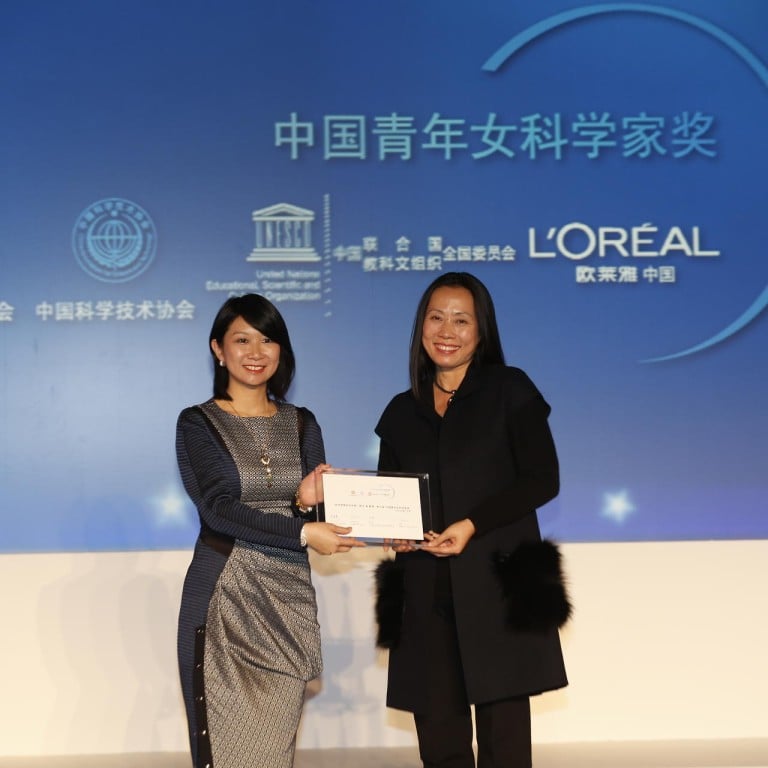Professor Rossa Chiu says raising her children is her biggest research project

Unlike most working mothers, medical researcher and professor Rossa Chiu Wai-kwan finds little difficulty in balancing her busy work schedule and spending time with her family. "Raising my children is the biggest research project of my life," she says.
Mother to her seven-year-old twin daughters, Chiu has a regular schedule mapped out. She finishes work at 7pm, dines with her daughters, checks their homework and sends them to bed.
"Whenever I am off my mum-duty I start thinking about work," she says. "But whenever I am with my family, I don't spend one second thinking about work. I get completely off the hook of my scientific research until my daughters go to school. The two fit with each other very well."

Chiu devotes a huge amount of time to her research, the best known one being the non-invasive prenatal diagnosis of fetal Down syndrome by massively parallel sequencing. Her team has gone further and headed towards non-invasive diagnosis of cancer, which is even more time consuming.
"Cancer is a very complicated genetic disease," she says. "A tumour has a lot of dead cells in it, which throws DNA into a person's plasma. Our research aims at determining the possibility of one having cancer by looking into plasmas. If it contains a lot of mutated DNA, it is very likely to be caused by cancer."
Over the past year, Chiu and her team have devoted themselves to developing a protocol that is much more affordable than the original one. "The cost of the original model is HK$80,000 per case and in a commercial operation, one test can cost double that. Also, it can only handle four cases per week," she says. "The cost of the new protocol can be lowered by 10 times and the efficiency can go up by 40 times and carry out 160 tests per week."

"Positron Emission Tomography, or PET Scan, is a way to check for cancer at the moment. But it is highly radioactive and can not be performed every year. Doctors wouldn't advise doing so unless they find it really necessary," she says. "It is our hope to develop a blood test that can also check for different types of cancer. There's no 'one-size-fits-all' cancer test at the moment, but we are working towards that."
Chiu says if this research succeeds, it might affect the diagnosis and treatment of cancer.
"Cancer is ever-changing. If a person goes for a check-up after cancer symptoms appear, it is usually too late. But if we can monitor the DNA of a person closely every year, we might be able to realise it at an early stage, say if the tumour is only one to two centimetres in diameter, it can be treated much more easily.

"Diagnosing cancer at an early stage is a hurdle. If we can overcome it, it would tremendously increase the chance of curing cancers and make many already-developed surgeries and medications much more cost-effective," Chiu says.
Despite the huge responsibilities her research carries, Chiu enjoys doing it.
"We scientists are all very driven. We come up with a hypothesis based on our professional knowledge, and we would like to prove it. It is like placing a bet against yourself. If you find something wrong about your hypothesis, you have to abandon the previous one and go with the new discovery. The process is very addictive," she says.
Going back to the biggest research project of her life, Chiu says that unlike medical research, there is no scientifically proven way to educate her daughters.
"There's no golden rule to parenting. How others raise their children does not necessarily apply to your case," she says. "There's no controlled experiment in parenting. It's not like if sample A doesn't work, you apply B instead. By the time you find out sample A doesn't work, your child has already become a grown-up. It is an extremely challenging experiment that I enjoy very much."
Looking back at her career, Chiu says she is lucky to have enjoyed massive support from her family. She decided to do her doctorate and receive specialists' training at the Prince of Wales Hospital simultaneously and those six years were harsh.
"I couldn't spare much time to be with my parents. At first they didn't understand why I couldn't attend any family gathering. And there's no substantial achievements on our research, so it was difficult to explain to them what I was doing. But still a lot of people were helping me out, fitting into my schedule. I always say that I can't do this job on my own. I'm very fortunate to have my family to be with me," she says.
As for her tip to working mothers in the same position? She says it is very important to be 100 per cent dedicated in whatever role one is doing. "Do not leave any loose ends at work or in the family," she says. "Make sure you don't need to think of work when spending time with family, or vice versa."

Cancer researcher says bringing up her twin daughters is her greatest research project